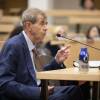After dozens of virtual forums organized by non-profits and special interest groups, the major candidates for Boston mayor appeared together for their first opportunity to draw clear distinctions among themselves before a television audience in an NBC10 debate.
For an hour, the quintet engaged (mostly politely) on topics like schools, housing, the city's pandemic response, climate change and police.
Here are the key takeaways:
1. Michelle Wu is sitting pretty, and her opponents recognize it.
Everyone who is not City Councilor Michelle Wu, the widely projected frontrunner, is fighting to leave a lasting impression in the race's waning days. But Wednesday night, the other candidates were not seeking to define themselves against Wu.
The norm in presidential primary debates is for everyone to pile on the front runner. By wounding or taking down number one, they enhance their own status. Those debates, however, take place months before Election Day. Lingering nastiness has time to dissipate before the average voter has to make a choice. With the September 14 preliminary election just days away, excessive aggression can carry a cost.
It appears that the real battle is for a second slot on the final November election, and that's a three-way tussle among Acting Mayor Kim Janey and City Councilors Andrea Campbell and Annissa Essaibi George.
2. Kim Janey excelled at maneuvering around politically damning questions.
Despite a relatively short career in electoral politics, Janey's debate performance offered a master class in pivoting, or what critics might call evasion. Still, there was smooth skill on display.
When asked why the city's school bus driver shortage was not solved before Boston Public Schools start Thursday, Janey pointed to news of a last-minute, temporary deal reached between the school district and the bus drivers' union.
When pressed by former economic development chief John Barros regarding her reference to the city's downward crime trends — a data point he argued only former Mayor Marty Walsh's administration can claim credit for — Janey said, "obviously it isn't enough," and "this isn't about data points." Janey foiled the assault, but in doing so did not offer any other specific plans.
Perhaps it's a skill one quickly masters when assuming an office replete with existing problems. Whatever the source of this skill, the fact that she needed to use it speaks to her status as a highly visible, but somewhat vulnerable candidate in the final days before voters go to the polls.
3. Campbell versus Janey: A contest within the larger race.
Although the field of major candidates is widely heralded as historically diverse, Campbell has been haunted by the suggestion that there is room for only one Black woman in the race — and that that women is Janey. (Campbell declared her candidacy only days after Wu last September while Walsh was still mayor.)
Campbell has made a practice of directly contrasting herself with Janey at every opportunity, and it's a practice she signaled she will continue in the final days of the preliminary.
She described the city's bus shortage situation as "unacceptable" moments after Janey was asked directly about it, and graded the city's COVID-19 response of "D," pointing to additional preventative steps the city could be taking.
The most recent mayoral poll shows Campbell now within striking distance of Janey, which may indicate the strategy has been successful. Campbell has momentum. The question is, how much?
4. Essaibi George: In her own lane and owning it.
While other candidates downplayed their previous expressions of support for reallocating police funding, City Councilor Annissa Essaibi George remained true to her clear and distinct position on police.
"We can talk about reallocation, we can talk about reinvestment, that's just another word for defunding public safety in this city," Essaibi George said.
The race's decisive moderate has recently taken a page from the playbook of moderate candidates in other major cities and turned her attention to crime as a strategy for drumming up support. The unique focus on the controversial issue means Essaibi George is all but guaranteed to attract single-issue voters who agree about leaving police money in the public safety budget and giving the force more boots on the ground.
5. Barros won't get a job in a Janey administration.
John Barros, the field's underdog, took full advantage of the televised debate format, dinging Janey on school buses, police, crime and the addiction crisis at the intersection of Massachusetts Ave. and Melina Cass Blvd., popularly known as "Mass. & Cass."
"We closed the engagement center," Barros said, referencing the area's recently shuttered comfort station). "That's not leadership, that's not the action we need. ... If the elected officials in office right now can't take care of it, we need better elected officials in office to do it."
On police, Barros said, "I'm not sure what Mayor Janey's plan is. I'd love for her to point to a plan [but], she doesn't have a plan."
Barros' team praised his display of “passion” on an otherwise reserved stage.





